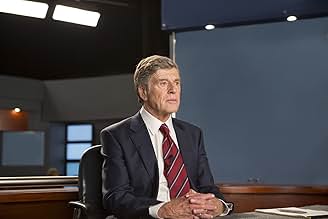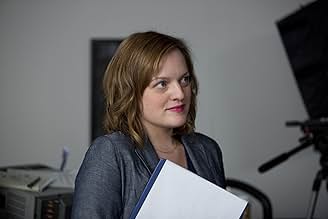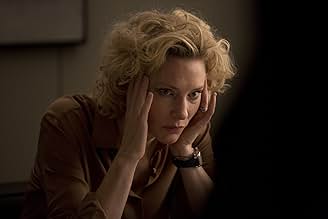Il servizio militare dell'allora presidente George W. Bush e la successiva tempesta di critiche che ha costato a Dan Rather e al produttore Mary Mapes le loro carriere.Il servizio militare dell'allora presidente George W. Bush e la successiva tempesta di critiche che ha costato a Dan Rather e al produttore Mary Mapes le loro carriere.Il servizio militare dell'allora presidente George W. Bush e la successiva tempesta di critiche che ha costato a Dan Rather e al produttore Mary Mapes le loro carriere.
- Regia
- Sceneggiatura
- Star
- Premi
- 1 vittoria e 6 candidature totali
Recensioni in evidenza
There are multiple messages the film tries to get across. One could be that people in positions of power can get away with certain things pretty easily. Another is that people can take advantage of the chaos that ensues after the outcry of a loud minority on the internet, with the help of other media outlets, to distract from the main story. The main theme, I would say, is that bullies come in all forms, and can be highly destructive.
I think that the film-makers wanted to elicit from their audience opinions about power imbalance and accountability, and maybe even sensationalism. Clearly the other news agencies depicted in the movie were guilty of sensationalist behavior. Perhaps the writers and directors and actors wanted to simply tell a true story about a brilliant journalist who had to struggle very hard to combat the gravity of hyped up nonsense. It was an insult to Mapes' professionalism to have to deal with lame bloggers who weren't accountable to anything (assuming this is even true). Maybe that's the movie's biggest flaw. I don't know what it wanted me to believe. I'm not going to think that Mapes and Rather were innocent just because Quaid whispered a cliché monologue about why they're so compatible with each other (the plane scene).
An original draft of this review had me ranting about the political landscape of 2005. I (sort of?) learned about an important part of American media history. But the focus of the film kept changing. Some themes would come and go while others would resurface in little intervals (three to be exact). For example, the movie started out strong, with high hopes about evidence of the scandal being strong and hard hitting. Then quickly the plot takes a 90-degree turn, and now we're watching Mapes struggling to resolve one measly discrepancy that's grabbing all the media attention. After that disaster subsides, we begin watching a movie about a corporate investigation into false journalism. The storytelling was incoherent, finding myself with unanswered questions as the next big event came.
Most of my questions regarded the documents. The technical military jargon in the dialogue was difficult to follow, adding to the confusion. I found myself repeatedly asking: "who's that guy? Why is he mentioned all of the sudden? John Kerry was a thing back then?" That last question speaks to my ignorance, but still, the dialogue was clunky.
If you watch the film conscious of the underlying theme, it'll be less painful. The theme whose undertones influences all of Mapes' actions is her relationship with her abusive father. She admits at one point that he's the reason she needs to stand up to bullies. And in each of the three stages described above, that is precisely her motivation. First, she "asks questions" about a possibly incriminating aspect of Bush Jr's military history. But what happens? The bully strikes her down. She fights back by proving that the stupid discrepancy wasn't a problem after all. All is good, except now everyone forgot what the story was about. The bully returns with an investigation into her conduct. She didn't do anything inherently wrong (she makes some mistakes though), but she's treated with a disproportionate level of scrutiny. Meanwhile, a man who possibly went AWOL during wartime is winning a presidential election.
When you go to watch the movie, perceive it as a series of acts, like in a play. Act one, the scandal gets out. Act two, the haters launch their attack. Act three, the investigation. On a road which begins with covering the news, and ends with covering your butt, one thing holds; bullies suck.
I'm not watching it again, C grade
Check out our other reviews at http://thefilmlawyers.wordpress.com
"Truth" begins with Mary Mapes (Blanchett) producing a "60 Minutes" special, in which host Dan Rather (Redford) presented documents of George W. Bush's military records, showing that he went AWOL during his time in the military and received special treatment. After the episode airing, bloggers and experts make accusations that the records are indeed fake. As Mapes and her team try anxiously to retrace their steps, inaccuracies and possible corruption is brought to light.
Putting politics aside, I've never read Mary Mapes' "Truth and Duty," the memoir on which the film is based upon. Going by what the film shows, Mapes' account of the aftermath following the "60 Minutes" special becomes a dog chasing its tail. Unsure if they were trying to portray an incompetent producer/journalist, or a misguided woman, led astray by false information. Nevertheless, Vanderbilt's script, at times, portrays a compelling argument in favor of the accuracy but leaves the audience wondering what he or anyone firmly believes. There is some great things happening in the story, that would have made a smarter, more interesting complete film. Vanderbilt explores the relationship of Mapes and her family, which makes for an interesting perspective to see her actions. Rather's tumultuous relationship with CBS is touched upon, but little else outside of the compounds of the cameras.
Calling back to a film like "Shattered Glass," Blanchett often feels like Hayden Christiansen, desperately believing the "story" but giving everyone around her doubt. Cate Blanchett's work explodes on screen, jolting in and out of coherent thoughts and persuasion, often never letting the viewer feel secure about their how they really feel about her. In one dynamite scene, and we'll call it her "Oscar scene," Blanchett controls the screen and her cast members with a bull-like charge, invoking and bringing to life, the best written scene of the film. It's one of her very best performances ever, and something that will courageously keep her in the Oscar conversation for Best Actress.
Robert Redford's stoic and reserved take on Dan Rather is a quiet storm, and likely the unsung hero of the film. He takes on the man's mannerisms but inserts his own sensibilities about how we perceive him to be. Dennis Quaid shines as an ex-Military personnel working on the story while Topher Grace goes a little bit overboard as a manic and shrill young journalists trying to find the conspiracy theories. Elisabeth Moss is regulated in general inquiries about the players behind the documents but offers little else in her underwritten role. Bruce Greenwood, as the president of CBS, is fantastically present. David Lyons also surprises as Josh Howard, a role that boils right to the top without going over. Same goes for the always diabolical Stacy Keach.
"Truth" excels in many of its technical merits. Brian Tyler's score offers depth and suspense to certain scenes while Mandy Walker's camera work softly maneuvers through the film. Richard Francis- Bruce's editing almost nailed a perfect ending to the film, but for whatever reason, was taken to one extra scene that the viewer truly didn't need.
"Truth" may not be an all-out homerun for Vanderbilt, but its a fine example of the exceptional work that Blanchett and Redford are capable of doing in any role they're given. Though not magnificently executed, I can't help but still ponder on its findings, and the questions that it brings up in its first few moments. He gets the mind thinking, and the juices flowing, before ultimately resting on the merits of two journalists that may or may not have been duped.
Every journalism student should see Truth, a true version of a true event that included liberal CBS; liberal anchor, Dan Rather (Robert Redford); and liberal producer for 60 minutes, Mary Mapes (Cate Blanchett). The latter two sacrificed their jobs possibly for the ideal of bringing down George W. Bush in his campaign to become president for the second time.
The journalists thought they had a story about Bush slacking in his National Guard tour, but what they had was forged documents that eventually cost them their jobs and credibility. Mapes was the prime agent of the fiasco, pushing to get a story on 60 Minutes when it was too close to deadline and more substantiation was needed for the source and his documents.
First-time director and seasoned-writer James Vanderbilt takes an almost cool approach, not quite as weighty as All the President's Men or as frenetic; the journalists young and old struggle with the profession's verity: Vet your stories and your sources until they bleed truth. Mapes and her vigilantes are up against a deadline, so more verifying of documents and sources is not possible. Thus, they should not have run with the story, but they did. Dan Rather, for all his experience as CBS news anchor, should not have trusted in Mapes' research, but he did.
Most of all they should not have trusted Lt. Colonel Bill Burkett (Stacy Keach), who provided the documents purporting to show Bush's slacking. Because Burkett was a known liar and fervent Kerry supporter, no one should have trusted him before corroborating his information. Journalism students, beware of cutting corners on the road to truth. The film is an excellent primer on best practices.
Truth is a classy, almost unbiased rendition of a true story, an entertaining thriller filled with first-rate actors. If there is one flaw, I submit for your consideration that the film is too reverent of Mapes and Rather, who made a blunder unworthy of their status and experience. They are more heroic than they deserve. As cautionary players on the big media stage, they are the finest examples of flawed human beings.
"I think journalism gets measured by the quality of information it presents, not the drama or the pyrotechnics associated with us." Bob Woodward
Dan Rather: Curiosity. Why'd you get into it?
Mike Smith: You.
These three simple lines cut right to the heart of Truth, the new movie from established writer and first time director James Vanderbilt (Zodiac, The Amazing Spider-Man). The news used to consist of hard hitting investigative journalism, a public service that would expose relevant stories to shed light on the true condition of a deceptive world. Now, instead of covering stories like The Watergate Scandal or what was really happening in Vietnam, newscasters have become mouthpieces. They have become the personalities on TV who we look to for a recap of what happened last night on American Idol or what President Obama had for breakfast this morning. Truth attempts to shed light on the corruption of investigative journalism by corporate greed and political agendas which make it impossible for respected newscasters and their producers to do their jobs, and in so doing it shows us a dangerous future of smoke and mirrors that is already taking hold. Despite some of the film's minor faults, Truth is a beautiful and moving Requiem for The News.
When a scandal does come along that could rock the foundation of American politics, such as the surfacing of the so-called Killian Documents, there are factions that will try to kill the story no matter how much evidence of proof exists. This is the story of Truth, based on the book written by...
Check out the full review on David 'n the Dark! https://davidnthedark.wordpress.com/2015/10/25/a-requiem-for-the- news/
Lo sapevi?
- QuizThe movie was shot in Australia at Cate Blanchett's request, as she wanted to be close to her family while filming.
- BlooperThe movie timeline shows June 2004 and Mary Mapes is meeting with Josh Howard and Mary Murphy. She describes Bill White as a "business man" in Houston. Bill White was the MAYOR of Houston. (as of January 2004.)
- Citazioni
Mary Mapes: Do you know what it would take to fake these memos?
Dick Hibey: Mary...
Mary Mapes: No, this is important. It would require the forger to have an in-depth knowledge of the 1971 Air Force manual, including rules and regulations and abbreviations. He would have to know Bush's official record front to back to make sure none of these memos conflicted with it. He would have to know all of the players in the Texas Air National Guard at the time, not just their names, but their attitudes, their opinions including how they related to one another. He would have to know that Colonel Killian kept personal memos like this for himself in the first place. He would have to know how Killian felt at the time particularly about his superiors and then First Lieutenant Bush. He would have to know or learn all of this in order to fool us as you assume he did. Now... Do you really think that a man who takes this kind of time and precision, then goes and types these up on Microsoft Word?
[Small pause]
Mary Mapes: Our story was about whether Bush fulfilled his service. Nobody wants to talk about that. They wanna talk about fonts and forgeries and conspiracy theories, because that's what people do these days if they don't like a story. They point and scream. They question your politics, your objectivity, hell, your basic humanity. And they hope to God the truth gets lost in the scrum. And when it is finally over and they have kicked and shouted so loud, we can't even remember what the point was.
- Curiosità sui creditiWilliam Devane as the voice of Gen. Hodges on the telephone is not listed in the cast.
- ConnessioniFeatured in Close Up with the Hollywood Reporter: Actresses (2016)
- Colonne sonoreString Quartet #1 - Allegro Assai
Written by Wolfgang Amadeus Mozart (as Wolfgang Mozart)
Courtesy of APM Music
I più visti
- How long is Truth?Powered by Alexa
Dettagli
- Data di uscita
- Paesi di origine
- Siti ufficiali
- Lingua
- Celebre anche come
- Conspiración y poder
- Luoghi delle riprese
- Aziende produttrici
- Vedi altri crediti dell’azienda su IMDbPro
Botteghino
- Budget
- 9.600.000 USD (previsto)
- Lordo Stati Uniti e Canada
- 2.541.854 USD
- Fine settimana di apertura Stati Uniti e Canada
- 66.232 USD
- 18 ott 2015
- Lordo in tutto il mondo
- 5.383.097 USD
- Tempo di esecuzione2 ore 5 minuti
- Colore
- Mix di suoni
- Proporzioni
- 2.39 : 1









































